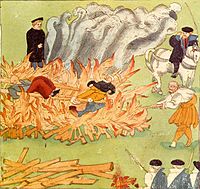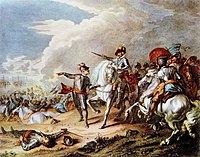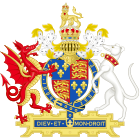-
Use Cases
-
Resources
-
Pricing
Reformation Leaders
Printing Press Revolutionizes Communication
1450
% complete
The invention of the printing press by Johannes Gutenberg allows for the mass production of books and pamphlets, facilitating the spread of Reformation ideas.
Image source: Printing press

Martin Luther's 95 Theses
Oct 31, 1517
% complete
Martin Luther, a German theologian and monk, publicly posts his 95 Theses on the door of the Castle Church in Wittenberg, challenging the Catholic Church's practices and sparking the Protestant Reformation.
Image source: Ninety-five Theses

Diet of Worms
Apr 18, 1521
% complete
Martin Luther appears before the Imperial Diet in Worms, Germany, to defend his beliefs but refuses to recant, leading to his excommunication by the Catholic Church.
Image source: Diet of Worms

Conflicts and Wars
Spanish Inquisition
1478
% complete
The Spanish Inquisition is established by the Catholic Monarchs, aimed at rooting out heresy and enforcing religious conformity in Spain and its territories.
Image source: Spanish Inquisition

Witch Trials
1500 - 1699
% complete
The period of the Reformation witnesses a surge in witch trials across Europe, as religious and social anxieties contribute to the persecution of individuals accused of witchcraft.
Image source: Witch-hunt

Zwingli's Death in Battle of Kappel
Oct 11, 1531
% complete
Huldrych Zwingli, a Swiss reformer, is killed in the Battle of Kappel, a conflict between Catholic and Protestant cantons in Switzerland.
Image source: Second War of Kappel

St. Bartholomew's Day Massacre
Aug 24, 1572
% complete
A targeted wave of violence against French Huguenots begins on the eve of St. Bartholomew's Day, resulting in the massacre of thousands of Protestants in France.
Thirty Years' War Begins
May 23, 1618
% complete
The Bohemian Revolt against the Habsburgs marks the beginning of the Thirty Years' War, a religious conflict that engulfs much of Europe and devastates the German states.
Image source: Thirty Years' War

English Civil War
1642
% complete
The English Civil War erupts between supporters of the monarchy (Royalists) and supporters of Parliament (Parliamentarians), further fueling religious and political tensions.
Image source: English Civil War

Doctrinal and Theological Developments
Anabaptist Movement Grows
1525
% complete
The Anabaptist movement, characterized by adult baptism and a separation of church and state, gains momentum across Europe.
Image source: Anabaptism

Augsburg Confession
Jun 25, 1530
% complete
The Augsburg Confession, drafted by Philipp Melanchthon, is presented to Emperor Charles V at the Diet of Augsburg, outlining the key beliefs of the Lutheran movement.
John Calvin's Institutes of the Christian Religion
Mar 22, 1536
% complete
John Calvin publishes the first edition of his influential work, "Institutes of the Christian Religion," which becomes a foundational text of Reformed theology.
Image source: Institutes of the Christian Religion

Counter-Reformation
1545
% complete
The Catholic Church launches the Counter-Reformation, a series of reforms aimed at addressing the criticisms of the Protestant Reformation and revitalizing Catholicism.
Council of Trent
Dec 13, 1545
% complete
The Council of Trent, convened by the Catholic Church, begins a series of meetings to address the Protestant Reformation, resulting in reaffirmation of Catholic doctrine and reforms within the Church.
Image source: Council of Trent

Political and Social Impact
English Reformation
1534
% complete
King Henry VIII's break from the Catholic Church leads to the establishment of the Church of England, marking the beginning of the English Reformation.
Image source: English Reformation

Act of Supremacy
Nov 3, 1534
% complete
The English Parliament passes the Act of Supremacy, declaring King Henry VIII as the Supreme Head of the Church of England, establishing the break from the authority of the Pope.
Image source: Acts of Supremacy

Calvinist Geneva
1541
% complete
John Calvin establishes a theocratic government in Geneva, Switzerland, implementing strict moral and religious laws based on his interpretation of Protestant theology.
Image source: Geneva

Peace of Augsburg
Sep 25, 1555
% complete
The Peace of Augsburg is signed, officially recognizing the principle of cuius regio, eius religio, granting German princes the right to determine the religion of their territories.
Image source: Peace of Augsburg

Edict of Nantes
Apr 13, 1598
% complete
King Henry IV of France issues the Edict of Nantes, granting limited religious freedom to French Protestants and ending the Wars of Religion.
Image source: Edict of Nantes

Peace of Westphalia
Oct 24, 1648
% complete
The Peace of Westphalia is signed, ending the Thirty Years' War and establishing the principle of state sovereignty, marking a turning point in European diplomacy.
Image source: Peace of Westphalia

Key Facts
- Martin Luther sparked the Reformation with his 95 Theses, which criticized the Catholic Church's sale of indulgences.
- The Reformation led to the establishment of Protestant churches, such as Lutheranism, Calvinism, and Anglicanism.
- The Council of Trent was a significant Catholic response to the Reformation, aimed at addressing corruption within the Church and reaffirming Catholic doctrine.
- The Peace of Westphalia in 1648 marked the end of the Reformation-era conflicts and recognized the principle of religious toleration.
- The Reformation had profound social and political consequences, including the Wars of Religion and the rise of national identities.
Source
This Protestant Reformation timeline was generated with the help of AI using information found on the internet.
We strive to make these timelines as accurate as possible, but occasionally inaccurates slip in. If you notice anything amiss, let us know at [email protected] and we'll correct it for future visitors.
Create a timeline like this one for free
Preceden lets you create stunning timelines using AI or manually.
Customize your timeline with one of our low-cost paid plans
Export your timeline, add your own events, edit or remove AI-generated events, and much more
Free
$
0
free forever
No credit card required.
Basic
$
10
/month
billed annually
Cancel anytime.
Pro
$
16
/month
billed annually
Cancel anytime.
Common Questions
Can I cancel anytime?
Yes. You can cancel your subscription from your account page at anytime which will ensure you are not charged again. If you cancel you can still access your subscription for the full time period you paid for.
Will you send an annual renewal reminder?
Yes, we will email you a reminder prior to the annual renewal and will also email you a receipt.
Do you offer refunds?
Yes. You can email us within 15 days of any payment and we will issue you a full refund.
What if I have more questions?
Check out our pricing docs or send us an email anytime: [email protected].